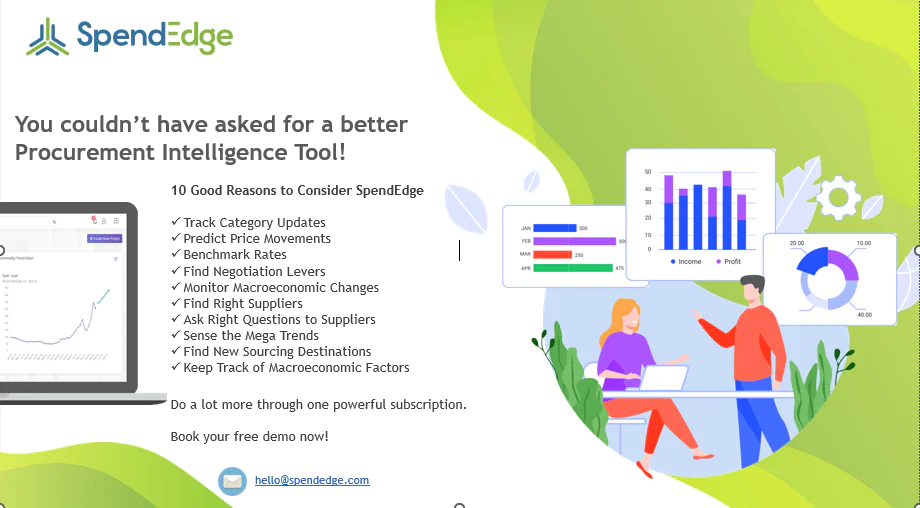In the eCommerce industry, the role of vendors and suppliers has become increasingly crucial, leading to many contracts, deals, and the need for clear insight into negotiations in procurement. As eCommerce retailers cope with the rapid surge in online shopping, rising consumer demand, and increasing competition, they must ensure their supplier relationships, contracts, and business partnerships are based on fair, mutually beneficial, and sustainable terms. Negotiation levers can include various facets of a contract, including cost, lead time, quality of service, and the basic demands for the product being procured. To ensure suppliers meet stipulated targets and expectations, companies must closely assess and understand the relationship between all levers and find a sustainable, beneficial, and achievable balance between all.
What are 5 Key Negotiation Levers in the Retail Industry?
-
No 1
Cost
All parties involved in the negotiation must aim to reduce costs, improve prices, and achieve high levels of profitability
-
No 2
Quality
The companies need to determine the industry standard to match or surpass the product quality requirements
-
No 3
Delivery
Lead time, speed-to-market, and production time are major negotiation levers contributing to overall profitability
-
No 4
Service
Service quality and compliance rate are essential to successfully pace with demand and gain a competitive edge
-
No 5
Product
The product to be procured, serves as a negotiation lever itself, as it significantly influences the various other levers being discussed and manipulated
No 1: Cost:
Paying low prices to suppliers can lead to low quality, reduced delivery speed, and lowered quality of service, causing a long chain of reactions along the supply chain, leading to customer disappointment. Therefore, when entering a new partnership, the cost of various factors such as services, products, delivery, and production should be at the forefront of discussions. All parties involved must aim to reduce costs, improve prices, and achieve high levels of profitability. Nevertheless, suppliers must quote a certain price to deliver products at a certain quality and speed while maintaining profitability. Simultaneously, businesses must maintain low costs, identify opportunities for improved prices, and procure high-quality products while matching industry standards for competitive pricing.
No 2: Quality:
In a competitive market, particularly with high demand, quality is the most significant differentiator for various target groups. It is necessary for companies to understand their target customers and determine the industry standard to match or surpass the product quality. When negotiating with suppliers, expecting a certain level of quality can immediately correlate to various aspects such as higher prices, the need for materials with better quality, and other cost-related challenges. Additionally, high-quality products may require companies to adjust delivery and lead time, thus, reducing speed-to-market and causing another obstacle in the supply chain, thus making quality a crucial but challenging negotiation lever.
No 3: Delivery:
Lead time, speed-to-market, and production time are major contributors to overall efficiency, inventory management, and consumer satisfaction levels. A slow supply chain can directly or indirectly lead to customer attrition and dissatisfaction. Therefore, delivery is a crucial negotiation lever that companies must discuss in-depth when developing contracts with new suppliers. However, maintaining a certain speed of delivery or production may require a compromise on quality, cost, or service from the vendors. To maintain a balance between all these factors and levers, businesses must understand the expectations of their market, along with the ability of their business partners and standards within the market.
No 4: Service:
Supplier relationships play a crucial role in the efficiency, profitability, cost, and sustainability of partnerships. Ensuring a certain supplier service quality and compliance rate is essential to successfully keeping pace with demand, maintaining reduced costs, overcoming industry risks, and receiving products that meet contract standards. When demand for increased speed, high quality, and lower costs combine, it may lead to a complex or strained relationship with suppliers. Therefore, when drafting a contract, companies must ensure the terms permit for error, enable a certain level of service from the suppliers, and provide the time, costs, and facilities to deliver products as per demand.
No 5: Product:
Depending on the market, eCommerce retailers often need to produce at a rapid speed, meet quality standards determined by industry leaders and competitors, meet consumer demand and expectations, and match competitive pricing. Finding a balance between these factors is a highly challenging task and cannot come at the cost of the product itself. During contract development, the product to be procured, serves as a negotiation lever itself, as it significantly influences the various other levers being discussed and manipulated. For instance, generic clothing that requires lower costs can be of a higher quality and can be delivered faster than customized artifacts-specific products such as memorabilia or cosmetic items. The nature of the product, the requirements of the market, and other logistic factors also significantly impact the negotiation with suppliers and contract development process.
Success Story
In the evolving eCommerce retail market, consumer expectations, the range of products offered, and the variety of pricing have expanded rapidly over recent years, particularly because of the significant decline in customer interest in brick-and-mortar stores. Struggling to keep pace with the market and to overcome these challenges, a renowned eCommerce retailer of organic and eco-friendly cosmetic products resisted maintaining a positive relationship with suppliers and witnessed a decline in compliance rates. Unable to understand the cause of these challenges, the company approached SpendEdge and sought to develop more robust and reliable contracts.
The experts at SpendEdge assessed the company’s contract drafting, negotiation methods, and management processes; and identified that the client had a lack of comprehensive understanding regarding negotiation levers, the relationship between them, and prioritization. With a comprehensive report, in-depth insights, and actionable recommendations from SpendEdge, the client gained a more complete and effective understanding of the negotiation process, enabling robust contract development and increased compliance rates.
Why SpendEdge?
For over a decade, SpendEdge’s platform has efficiently presented insights on strategic negotiation levers to 500+ companies worldwide. We offer in-depth insights that help our customers devise powerful negotiation strategies tailored to the client’s growing business needs.





